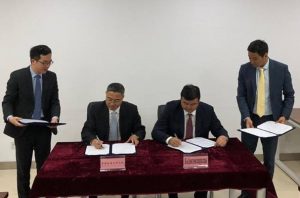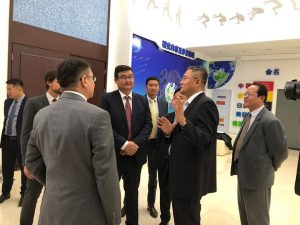
 Beijing, China, October 15 – As part of GGGI’s support to the Energy Regulatory Commission (ERC) of Mongolia, framed in the MoU signed in March 2017, the Global Green Growth Institute (GGGI) Mongolia and China programs have facilitated the signing of a Memorandum of Understanding (MoU) between the ERC of Mongolia and the National Institute of Standardization (CNIS) of the People’s Republic of China at the CNIS Changping Laboratory in Beijing today. The ERC and CNIS will collaborate in several areas, which include harmonizing relevant energy efficiency standards for electric appliances and equipment, exploring possibilities for setting up a joint testing laboratory, exchanging experiences, information and providing support.
Beijing, China, October 15 – As part of GGGI’s support to the Energy Regulatory Commission (ERC) of Mongolia, framed in the MoU signed in March 2017, the Global Green Growth Institute (GGGI) Mongolia and China programs have facilitated the signing of a Memorandum of Understanding (MoU) between the ERC of Mongolia and the National Institute of Standardization (CNIS) of the People’s Republic of China at the CNIS Changping Laboratory in Beijing today. The ERC and CNIS will collaborate in several areas, which include harmonizing relevant energy efficiency standards for electric appliances and equipment, exploring possibilities for setting up a joint testing laboratory, exchanging experiences, information and providing support.
This important step follows GGGI’s Knowledge Sharing (KS) event held in April 2018 in Beijing, PRC, which was intended to build the capacity of decision makers of the Ministry of Energy (MoE) , the ERC, the General Agency for Specialized Inspection and large energy companies through experience exchange on energy efficiency and ESCO development in Beijing. As a result of this engagement, the ERC has successfully laid the foundation of a structured cooperation with the Chinese National Institute of Standardization (CNIS), the National Energy Conservation Center (NECC) and the China Energy Management Companies’ Association (EMCA).
The MoU was signed by Mr. Tuvshinchuluun Erdenechuluun, State Commissioner of the ERC and Mr. Liu Hongsheng, President & Deputy Secretary of the Party Committee of CNIS. Mr. A.Batzul, Counsellor of the Embassy of Mongolia to China also attended the MoU signing ceremony.
GGGI Mongolia Country Representative, Romain Brillie said that “As an intergovernmental organization, GGGI’s mandate is to facilitate the exchange of experience between its countries of operation at the benefit of the realization of their green growth agenda and Nationally Determined Contributions to the Paris Agreement on climate change. Mongolia’s potential for improved energy efficiency is large, and Mongolia has laid the foundations of a favorable policy framework for energy efficiency projects to strive. This includes the design by the ERC, with our support, of an energy efficiency Standards and Labeling regulation for electrical appliances, which will soon be adopted. I believe this MoU is a first important step for Mongolia to step-up its efforts in supporting the adoption of more energy efficient appliances and I am delighted that the ERC and CNIS will collaborate in that direction in the future.
“I hope the MoU we sign today will facilitate a strong partnership between our two countries through ERC and CNIS. Working closely with Chinese government partners such as CNIS enables the ERC to enhance the development of energy efficiency and conservation in Mongolia, bringing the country energy sector to a new stage. This MOU is a result of hard work of both CNIS and ERC
staff as Mr. Liu Hongsheng mentioned. The MoU compliments our visit of April 2018 to the CNIS. Within framework of the Mongolian Law on Energy Efficiency and the National Energy Efficiency Action Program, the ERC is happy to learn more from the CNIS’s experiences of implementing the energy efficiency policy in the country takng into account that China is large importer of electric appliances to Mongolia” said Mr. E. Tuvshinchuluun, the State Commissioner of the ERC of Mongolia.
Mr. Liu Hongsheng, President & Deputy Secretary of the Party Committee of CNIS said “During the visit from the MoE, ERC and other government delegates to the CNIS in April of this year, we acknowledged that two countries have common agenda in regards of the energy efficiency policy implementation, and its standards and labeling for electric appliances. I am happy to see that within only 6 months, we are signing the MoU of collaboration with ERC today. We are sure that it will be laying out very solid foundation for our cooperation in the future. We are thankful for GGGI for their facilitation and support to making this wonderful collaboration of China and Mongolia to happen”.
Another MoU of Cooperation is planned to be signed between ERC and the National Energy Efficiency Center of the People’s Republic of China by end 2018, for which GGGI is also providing direct facilitation.
About the Global Green Growth Institute (GGGI)
Based in Seoul, GGGI is an intergovernmental organization that supports developing country governments transition to a model of economic growth that is environmentally sustainable and socially inclusive. GGGI delivers programs in 27 partner countries with technical support, capacity building, policy planning & implementation, and by helping to build a pipeline of bankable green investment projects.
About the Energy Regulatory Commission (ERC)
The ERC regulates generation, transmission, distribution, and dispatching and supply of the energy pursuant to the Law on Energy. Also, ERC is responsible for implementation of state policies and other legal acts on Energy Conservation according to the Law on Energy Conservation (www.erc.gov.mn).
The Government of Mongolia identified its policy on Energy conservation and recently adopted the Law on Energy Conservation in 2015 and the National Action Plan of the Energy Efficiency (NEEAP) in 2017 respectfully. Within frameworks to implement the Law on Energy Conservation and other relevant legal acts, the ERC is aiming to develop cooperation between Mongolia and China on energy conservation, including investment made to the energy conservation and identify potential areas of collaboration.
ERC is one of major counterparts of GGGI Mongolia in implementing Sustainable Energy Program in the country under the MoU signed between ERC and GGGI signed in March 2017.
About the China National Institute of Standardization
The China National Institute of Standardization (known as the Institute of Standardization of the State Science and Technology Commission when set up in 1963) is directly subordinate to General Administration of Quality Supervision, Inspection and Quarantine of the People’s Republic of China (AQSIQ). As a national social service institution dedicated to standardization researches, it mainly addresses the global, strategic and comprehensive standardization issues in national economy and social development of China.
Currently, CNIS has over 500 employees, including research fellows and doctor degree-holders and its researches mainly involve the standardization development strategy, basic theories, principles and approaches, and standards systems.